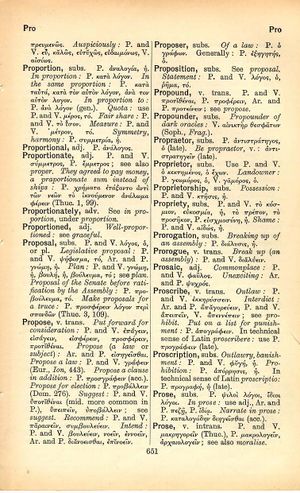propraetor: Difference between revisions
Ἐν γὰρ γυναιξὶ πίστιν οὐκ ἔξεστ' ἰδεῖν → Vix feminarum in genere reperies fidem → Bei Frauen lässt sich Treue nämlich nicht erspäh'n
(3) |
m (Woodhouse1 replacement) |
||
| Line 1: | Line 1: | ||
{{Woodhouse1 | {{Woodhouse1 | ||
|Text=[[File:woodhouse_651.jpg|thumb|link={{filepath:woodhouse_651.jpg}}]] | |Text=[[File:woodhouse_651.jpg|thumb|link={{filepath:woodhouse_651.jpg}}]] | ||
P. [[ἀντιστράτηγος]], ὁ (late). | ===substantive=== | ||
[[prose|P.]] [[ἀντιστράτηγος]], ὁ (late). | |||
[[be propraetor]], v.:[[ἀντιστρατηγεῖν]] (late). | |||
}} | }} | ||
{{Lewis | {{Lewis | ||
Revision as of 09:12, 20 May 2020
English > Greek (Woodhouse)
substantive
P. ἀντιστράτηγος, ὁ (late).
be propraetor, v.:ἀντιστρατηγεῖν (late).
Latin > English (Lewis & Short)
prō-praetor: ōris, m. (also prōprae-tōre or prō praetōre, indecl.),
I a magistrate in the times of the republic, who, after having administered the prœtorship one year in Rome, was sent in the following year as prœtor to a province where there was no army, a proprœtor (class.).—Form propraetor: cum bella a propraetoribus administrantur, Cic. Div. 2, 36, 76.—Form pro praetore, Sall. J. 103, 4: prorogatum Tubulo est, ut pro praetore in Etruriam succederet Calpurnio, Liv. 27, 22, 5.—
II One who administers the prœtorship of a province in the absence of the prœtor: Aulo fratre in castris pro praetore relicto, Sall. J. 36, 4: quem pro praetore in castris relictum supra diximus, id. ib. 37, 3; Liv. 10, 25, 11; 29, 6, 9; Tac. A. 2, 66 al.; Caes. B. G. 1, 21.
Latin > German (Georges)
prō-praetor, ōris, m. u. pro praetore, der nach Verwaltung der Prätur als Statthalter in eine Provinz ohne milit. Kommando geschickte Prätor, der Proprätor, Cic. u.a.
Latin > English
propraetor propraetoris N M :: ex-praetor; one sent to govern a province as praetor

